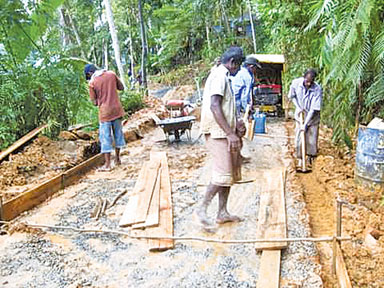|
World Day of Social Justice 2011:
Time for a new era of social justice based on decent work - ILO DG
Juan Somavia
"It is time to build a new era of social justice on a foundation of
decent work," says ILO Director General Juan Somavia.
Recent events flashing across the world's television screens have
brought into sharp focus demands that have been brewing in the hearts of
people: the desire for a decent life and a decent future based on social
justice.
 The fault lines of the global economy, apparent for a long time, are
cracking open to reveal uncertainty and vulnerability, sentiments of
exclusion and oppression and a lack of opportunities and jobs, made more
painful by the global economic crisis. The fault lines of the global economy, apparent for a long time, are
cracking open to reveal uncertainty and vulnerability, sentiments of
exclusion and oppression and a lack of opportunities and jobs, made more
painful by the global economic crisis.
Women and men without jobs or livelihoods really don't care if their
economies grow at 3, 5 or 10 percent per year if such growth leaves them
behind and without protection. They do care whether their leaders and
their societies promote policies to provide jobs and justice, bread and
dignity, freedom to voice their needs, their hopes and their dreams and
the space to forge practical solutions where they are not always
squeezed.
The reality is that people commonly judge whether society, the
economy and the polity are working for them through the prism of work.
Whether they have a job, or not, the quality of life it permits, what
happens when they have no work or cannot work. In so many ways the
quality of work defines the quality of society.
Yet the world of work is in tatters today: more than 200 million
people are unemployed worldwide, including nearly 80 million youth, both
figures are at or near their highest points ever. What is more, the
number of workers in vulnerable employment (1.5 billion) and the 630
million working poor living with their families at US$ 1.25 a day or
less, is increasing.
At the same time, global inequalities are growing. The crisis has cut
wage growth in half, reduced social mobility through work and trapped
more and more people in low-paid jobs. Income gaps are growing in some
countries. Youth face the increasing likelihood of never finding a
decent job; the prospect of a lost generation looms. And the middle
class often finds itself in the middle of nothing and going into
reverse.
Achieving a fair globalisation calls for a new vision of society and
economy, with a balanced approach to the role of state, markets and
society and a clear understanding of the possibilities and limitations
of individual action in that framework. Action must go beyond simply
recovering growth - we will not get out of the crisis with the same
policies that led to it. We need to move towards a new era of social
justice. What will it take? In the world of work the steps are clear:
First, recognising that labour is not a commodity, policies must be
based on the human values of solidarity, dignity and freedom. Labour is
not just a cost of production. It is a source of personal dignity,
family stability and peace in communities.
Second, make employment creation targets a central component of
macroeconomic policy priority alongside low inflation and sound fiscal
accounts.
Third, provide fiscally sustainable social protection to the eight
out of 10 people who lack any form of social security in the world
today, starting with a basic floor of universal social protection.
Fourth, recognise that fundamental rights at work and social dialogue
which belong to the realm of human freedom and dignity are also
instruments of enhanced productivity and balanced development.
Fifth, stimulate investment and investors in small enterprises,
employment intensive sectors, inclusive labour markets and skills
development.
As Tunisia and Egypt are showing us, jobs and justice, bread and
dignity, protection and democracy, national and global security are not
unrelated demands. What happens in the future will very much depend on
whether the connections are recognised and acted upon. Decent work makes
the connections.
Universal and lasting peace can be established only if it is based on
social justice. The cautionary words of the ILO's 1919 Constitution
resonates today.
It is indeed time to build an era of social justice on a foundation
of decent work.
|

